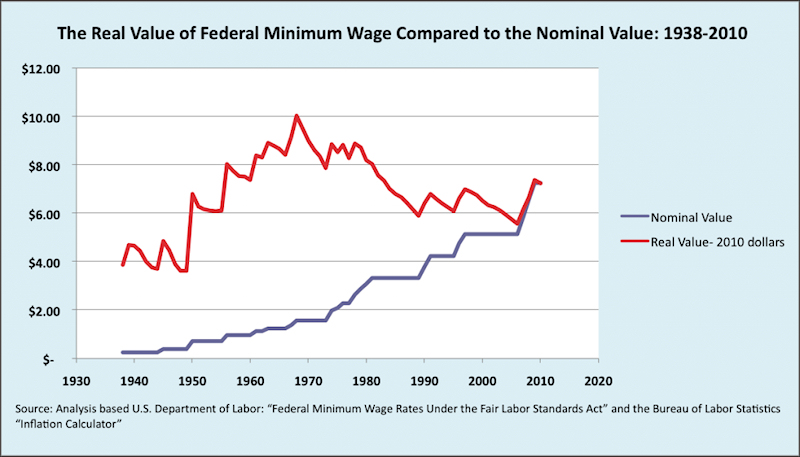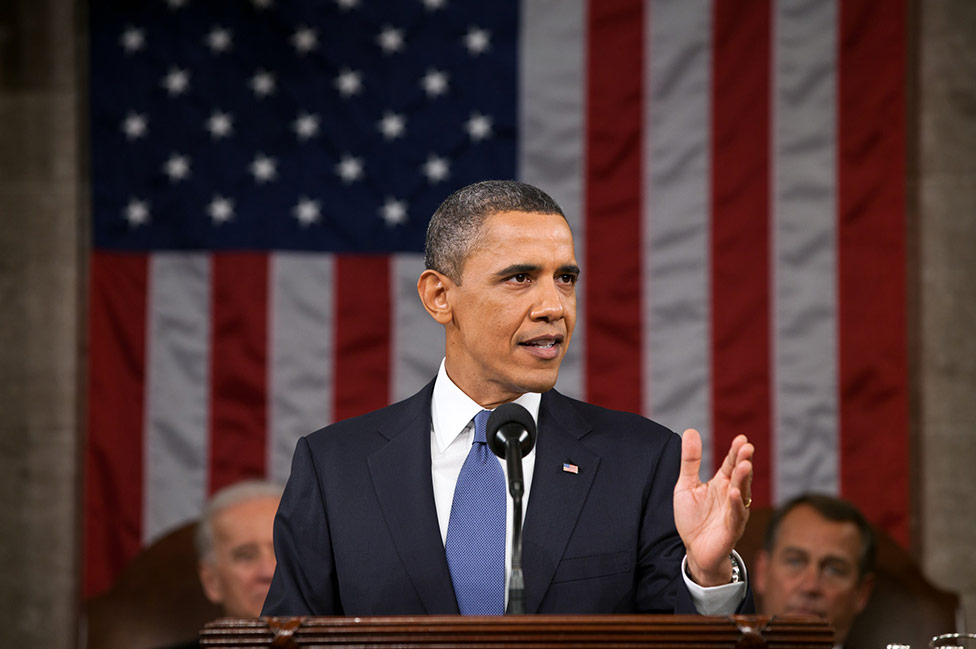I usually don’t tolerate spoilers, but today I’ll make an exception.
About an hour ago, mainstream news outlets broke the story about 12 hours in advance of the State of the Union that President Obama would be announcing an executive order to raise the minimum wage for federal contractors from the federal minimum of $7.25 to $10.10.
For those who don’t want to whip out their calculators, that’s an incredible, whopping, 40% increase, and is a reasonable approximation for a living wage in most parts of this country.
This is incredible news. I mean, incredible.
For the last three decades, increases in the federal minimum wage have failed to keep pace with inflation, which has effectively reduced the value of the minimum wage in this country.

Last year, President Obama urged Congress in his State of the Union speech to raise the federal minimum wage — a standard that would apply to all workers in this country. However, that executive priority (like many of Obama’s requests) was mired in political bickering and stymied by Republican obstinance. If nothing else, 2013 has demonstrated that Republicans are willing to sink the entire country in order to throw roadblocks before an Obama presidential legacy: even debt ceiling votes lead to government shutdowns. Against this political landscape of a do-nothing Congress, I am heartened by Obama’s willingness to exercise his executive authority to get something done.
Asian Americans should be excited by this news. In several recent posts, I’ve discussed how many Asian American ethnic groups experience above-average unemployment.
Of those Asian Americans who are employed, only about 3% of minimum wage workers are Asian American (compared to the national average of 5%). However closer examination of this statistic reveals some shocking disparities. Nearly 6% of Asian American women work at the minimum wage or lower, and Asian American women are disproportionately over-represented in service sectors that are more likely to be minimum wage jobs. A shocking 12.6% of Asian Americans live in poverty (marginally above the national average at 12.4%), with rates far higher among certain Asian ethnic groups: Hmong (37.8%), Cambodian (29.3%), Laotian (18.5%), and Vietnamese (16.6%). Furthermore, reported minimum wage statistics fail to reflect the harsh reality for Asian American low-wage workers: one study shows that many Asian American minimum wage workers (many of whom are immigrants) are cheated out of their pay and are otherwise exploited by their (often Asian American) employers.
For those Asian Americans working at a minimum wage for the federal government, this 40% boost in income is welcome news. But while not all or even most of these Asian Americans are working for federal contractors, President Obama’s initiative is also likely to seriously impact how minimum wage is viewed and implemented in this country. Payment of a living wage to employees of federal contractors will create competition within the market that will encourage non-federal contractors to also increase their wages above the minimum wage standard. It will also establish a political precedent for setting the minimum wage at the living wage; a political precedent that we can hope will translate to widespread hiking of the national minimum wage down the road.
As for who will pay for this — again, Asian Americans are at the forefront. Of small business contractors bidding for federal contract work, Asian American-owned small business are more active in seeking federal contract work, and are more successful than non-Asian-owned small businesses in winning those contracts (source).
While this might be cause for some grousing among Asian Americans, studies also show that Asian American-owned federal contractors are making the big bucks: nearly half of Asian American-owned small business with federal contracts exceed $1 million dollars in revenue. Asian Fortune reports even higher numbers: they cite studies showing 44% of Asian American-owned small business contractors winning contracts exceeding $10 million dollars while 81% have a contract $1 million or higher. In short, when it comes to who will be implementing President Obama’s executive order, many of those businesses will be Asian American. This is a ripe opportunity for successful Asian Americans to signal their progressiveness when it comes to fair worker treatment.
More importantly, the cost for the higher wages will be reflected back onto the government (and therefore the taxpayer) rather than to be carried solely by federal contractors (Asian American-owned or otherwise). The cost for this higher wage will be written into contracting bids — across the board — which shouldn’t significantly impact the success rate for Asian American federal contractors.
Instead, this is a symbolic gesture demonstrating that the federal government can and should be following the living wage model, rather than the arbitrary and meaningless minimum wage.
Above all, I am excited that Asian Americans — both minimum wage workers and federal contractors — can help pioneer that cultural shift in how we approach worker compensation in this country. I am energized that the face of higher labour standards in this country might include distinctively Asian American faces. It’s about time.
Please join me tonight starting at about 8:30pm EST for my live-tweet coverage of this and the rest of President Obama’s State of the Union Address at @Reappropriate.


